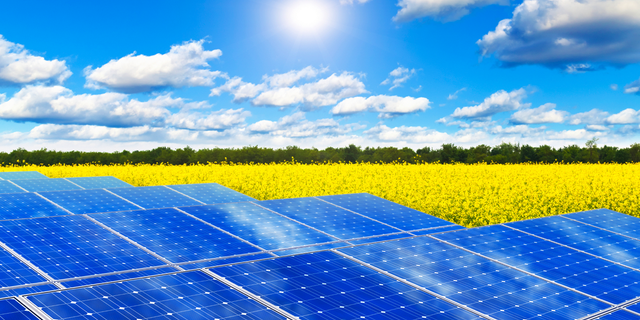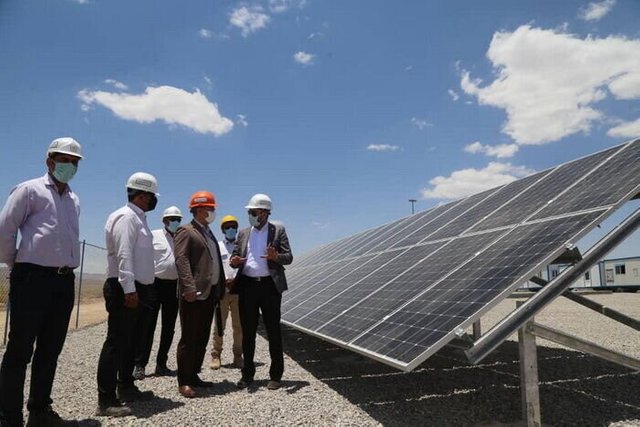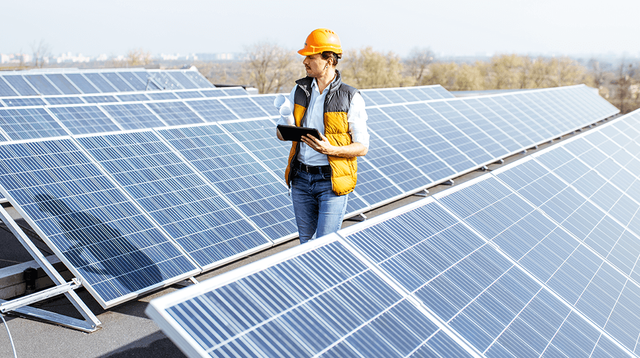
The government badly needs to generate more renewable energy to meet its emission targets and make the UK more energy independent.
But some of its own MPs are among those lining up against projects that could power hundreds of thousands of homes.
At least 20 have publicly spoken out against solar or wind projects in their own constituencies in the past two years.
Many of them say they fully support increasing energy from renewables.
But building wind turbines and solar panel farms can be deeply unpopular in constituencies.
Cabinet ministers know this too - and have even been debating giving people who live near wind farms energy bill discounts to sweeten the pill.
MPs join protest march against solar farm
The race is on to solve the UK's energy crisis
Energy bill help for people near turbines considered
Prime Minister Boris Johnson has made it clear that offshore wind farms and more nuclear power are his preferred options to tackle the UK's future energy needs.
But onshore wind, and solar panels, are also expected to be part of the mix when the government unveils its new energy strategy next week.
Large solar panel farms - known as arrays - have tended to fly below the radar as an issue, but are facing increasing local opposition.
A proposal to build the UK's largest solar farm on the Cambridgeshire-Suffolk border is being opposed by Treasury Minister Lucy Frazer and former health secretary Matt Hancock - who was also, briefly, an energy minister.
They say the development is too big and say they are concerned about the safety of large batteries which would be used on the site to store electricity.
In its application, the firm behind the farm, Sunnica, said the development would help to meet the "national need for new, renewable means of energy".
Further north, in Lincolnshire, the famously flat landscape has attracted applications for several large-scale solar farms, crossing over into neighbouring Rutland and Nottinghamshire.
Two of the schemes alone would cover more than 5,000 acres of land between them.
But it's thought they could generate more than 800mw of energy - which, it's claimed, could power 236,000 homes.
Some local Conservatives have voiced their opposition - and so has local Green Party councillor Rick Wilson.
He believes his victory over the Conservatives in a recent by-election for Tory-run Rutland County Council was, in part, because he had spoken against one of the projects.
He says in its current form, the project would "obliterate the area" and that it needed to be "scaled down".
'Community buy-in'
Tory MP Brendan Clarke-Smith, whose Nottinghamshire constituency is also a proposed location for a solar farm, said there was "a lot of support" for renewable energy, but it depended on how it was delivered.
He told the BBC: "The key is making sure this is done in the most effective way and takes into account the views of local people".
He added that communities near solar farms "aren't being offered any sort of benefit in terms of their own energy needs, so it's unsurprising there isn't a community buy-in in many cases".
Many people who object to new solar farms think they are an eyesore - but others worry about the impact they could have on nature, or even the food supply.
Kevin Hollinrake, who represents Thirsk and Malton, says some landowners "can make a lot more from a solar farm than from the land".
He denies pandering to voters in his picturesque corner of North Yorkshire, joking that he can't be a Nimby because he is also enthusiastic supporter of fracking.
"You can't divorce the needs of a constituency from the needs of the nation," he adds.

Another senior Tory MP, who did not wish to be named, says energy should be generated "close to the point of demand," with solar panels fitted to all new buildings such as prisons, factories, offices and schools.
The government points out that solar energy is subject to "strict planning controls to protect local communities and the environment".
A government source also insists that using agricultural land for solar panels can be "an important revenue stream" for farmers, helping them to keep their farms viable.
Solar power was, furthermore, the "cheapest renewable that we have" and it could easily live alongside food production, added the source.
Convincing local people, of any political persuasion, of the need for acres of solar panels or new wind turbines on their doorstep is never going to be easy.
Conservative MPs, and some of their colleagues in the cabinet, have the power to blow Boris Johnson's clean energy ambitions seriously off course in the next few weeks.
But ultimately, a big increase in renewables will mean panels, turbines and other bits of kit will need to go somewhere.
Determining exactly where will require some delicate diplomacy.
